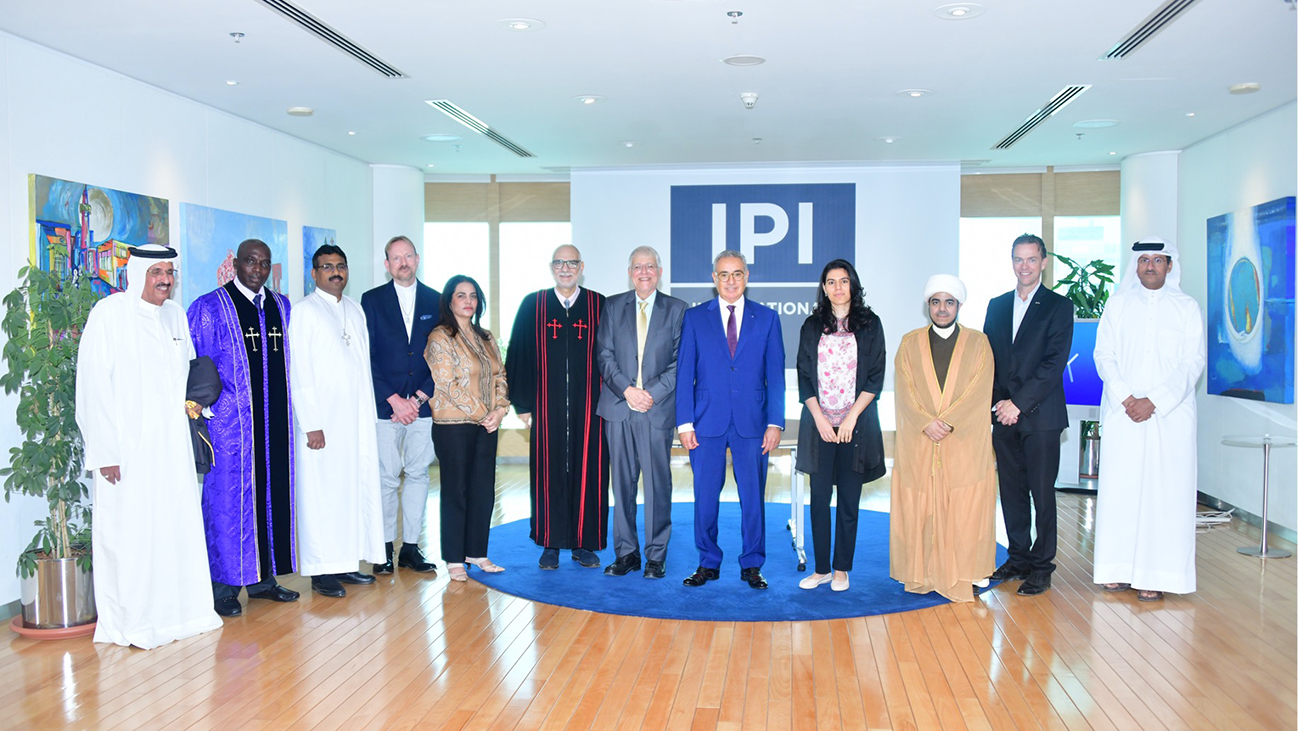
Interfaith leaders, religious representatives, private sector, and key players convened at IPI MENA to call on local, regional, and global communities to counter hate narratives, violent extremism, and current global challenges, through solidarity, tolerance, empathy, and open dialogue.
On March 15th, IPI MENA hosted an interfaith roundtable conference under the theme “Interfaith Solidarity & Global Challenges to Peace” in partnership with Reverend Hani Aziz, Pastor of Arabic Language Congregation at the National Evangelical Church, & Al Bayareq Bayda Society.
Opening the conference, IPI MENA Senior Director Nejib Friji underlined the current challenges facing the multilateral system; from political and economic uncertainty, hate crimes, and humanitarian crises, to destructive ramifications of climate change and an era of mass migration.
“It is precisely during these moments that interfaith alliances can support the multilateral system,” he stressed. “I’m strongly encouraged to see the many different faiths gathered here today; Baha’i, Christian, Hindu, Jewish, Muslim, among others – we are a representation of what is needed in the multilateral system; unity, solidarity, empathy, tolerance, and open dialogue.”
“I hope you will join me in calling on religious leaders, academics, civil society, media, and communities to work towards further solidarity and partnership between all parties, at the local, regional, and international levels to build a culture of peace, security, and stability,” he stated.
Reverend Hani Aziz stressed the importance of understanding the different cultures and religions that live together. “We all have one goal, one vision, which is to work for peace,” he stated. “If we do that, we can change society from this very room.”
Reverend Dr. Richard M. Fermer, Dean of St. Christopher’s Anglican Cathedral in Bahrain underlined that peace from Judeo-Christian traditions, speaks of wholeness and unity. “Moving towards that unity, we must see the similarities between religions, but also recognize the differences and that is how we move into dialogue,” he stated.
This was reaffirmed by Ebrahim Nonoo, Representative of the Jewish Community and President of the Association of Gulf Jewish Communities, who pointed to the ways in which dialogue can occur, starting with education and children. “Children must ask the questions that are burning inside them, and we have a responsibility to answer them from a religious perspective – this is how you create understanding and build empathy towards tolerance,” he stressed.
He pointed to the role IPI and think tanks can play in creating a safe space for interfaith understanding through youth and voiced his strong support for such an initiative.
Reminding the audience that permanent peace is the goal for everybody, Mannai Trading General Director Darwish Mannai noted the encouragement of diverse faiths in Bahrain and stressed the key role of education. “Public awareness should start in kindergarten, at the lowest stages of schooling. It starts with the youth.”
Zakiuddin Abbas, representative of the Bohra community, underlined that education does not only remain in the schools and academic spheres but in the home as well. “A child learns from home first; how to talk, walk, how to behave in society, how to deal with people different from them.”
Acknowledging the role of education, Dr. Abdulla Al Maqabi, Law Courts Directorate at the Bahrain Ministry of Justice & Islamic Affairs, representing the Shia community noted the subjectivity of peace. “There is a difference between what you understand and what I understand about peace. This is what creates the differences and divides,” he emphasized calling for a more unified stand to tackle prejudices and enhance understanding among religions and cultures.
Pastor Isaac Inayat, Urdu Language Congregation of the National Evangelical Church noted two processes involved in the goal towards peace: “We need to learn more about different communities and faiths, and we need unlearn the prejudices that were subconsciously placed on us as children, this is how we achieve peace,” he stated. “It is a long journey, and there will be opposition, but it is possible.”
Pastor Job Nelson of Bethel Church of Nations, representing the African community in Bahrain underlined that every individual faces various troubles and problems, and when these aren’t addressed, it can escalate into a bigger issue that impacts society and disturbs the peace of the community. “One aspect of peace,” he noted, “is the ability to solve problems. We must not walk away from this gathering today and forget what was said, it needs to be implemented in our daily lives,” he warned.
Shahnaz Jaberi, Trustee Member of the King Hamad Global Centre for Peaceful Coexistence and representative of the Baha’i Religion referenced Baha’i principles and the importance of working together. “Peace cannot be achieved if we work alone,” she stressed. “The betterment of the world can be done through joint efforts and cooperation.”
Pointing to Bahrain’s religious tolerance and encouragement of interfaith practices, David Axtell, Lay Chair, St. Christopher’s Anglican Cathedral, stressed the importance of recognizing the differences not only between different faiths but among similar faiths as well. “We need to move now beyond the talking stage,” he noted, in support of Nonoo’s suggestion, “we must turn into action, it is a long journey that can’t be done in one big step, but many small steps together.”
Acknowledging the importance of action, Jalal Khalil, coordinator of the Office of Relations of the Baha’is of Bahrain, encouraged the implementation of workshops with students and youth to engage in translating principles of peace into practical educational steps that would encourage exposure to different faiths.
The conference was concluded with a Baha’i prayer for peace performed by Shahnaz Jaberi, and following a call of solidarity from all interfaith leaders and religious representatives, a working group will be established with the participants to follow up on working at an educational level with line ministries.







